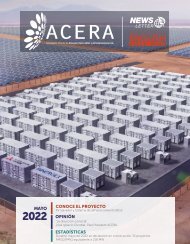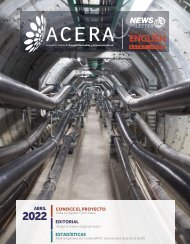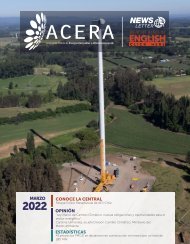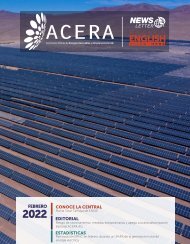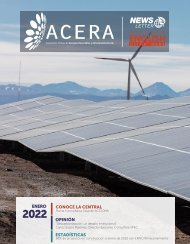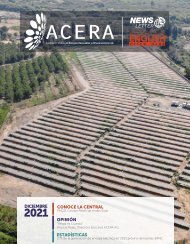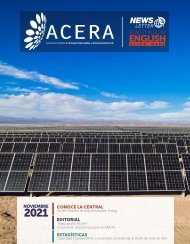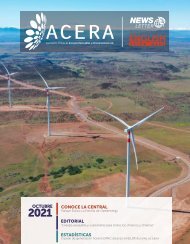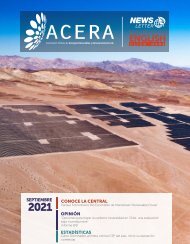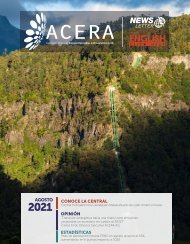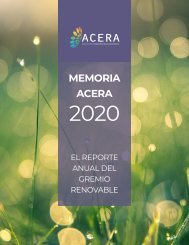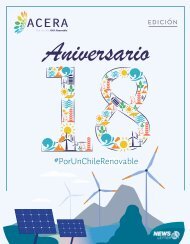Newsletter ACERA - Mayo 2020
You also want an ePaper? Increase the reach of your titles
YUMPU automatically turns print PDFs into web optimized ePapers that Google loves.
READ IT ALSO IN<br />
ENGLISH<br />
MAYO<br />
CONOCE LA CENTRAL<br />
Cabo Leones I, de EDF Renewables<br />
<strong>2020</strong> EDITORIAL<br />
"La regulación del sector eléctrico necesita de consistencia"<br />
Editorial <strong>ACERA</strong> AG.<br />
ESTADÍSTICAS<br />
ERNC alcanzan un 18% de participación de la matriz en mayo
CONOCE<br />
la central<br />
PROYECTO<br />
CABO LEONES I<br />
Tecnología: Eólica<br />
Empresa Socia de <strong>ACERA</strong>: EDF Renewables<br />
Potencia Instalada: 115,5 MW<br />
Región: Atacama<br />
Sistema al que inyecta: Sistema Eléctrico Nacional<br />
El Parque Eólico Cabo Leones I de Ibereólica Renovables y EDF<br />
Renewables se ubica en la comuna de Freirina, provincia de<br />
Huasco. Tiene una capacidad de generación de energía eléctrica<br />
renovable de aproximadamente 367 GWh anuales, suficientes<br />
para abastecer las necesidades de energía de 175.000 hogares,<br />
evitando la emisión de 350.000 tCO2-eq por año. El parque<br />
siempre ha desarrollado un diálogo permanente con las<br />
comunidades y se comprometió con el desarrollo local a través<br />
de un fondo de inversión social que permite concretar las<br />
iniciativas de las comunidades vecinas.<br />
En 2019, Cabo Leones I concluyó pruebas que permitieron, por<br />
primera vez a una central eólica, participar en el Control<br />
Secundario de Frecuencia del Sistema Eléctrico Nacional (SEN) y<br />
aportar flexibilidad al sistema.<br />
EDF Renewables es un líder mundial de las energías renovables,<br />
con más de 12 GW de capacidad instalada en más de 20 países.<br />
Sus actividades en Chile incluyen las plantas fotovoltaicas Bolero<br />
(146 MW, Antofagasta) y Santiago Solar (115 MW, RM).
ÍN<br />
DI<br />
CE<br />
04.<br />
05.<br />
08.<br />
10.<br />
Atlantica<br />
11.<br />
Solarpack<br />
EDITORIAL<br />
"La regulación del sector eléctrico necesita de consistencia"<br />
Editorial <strong>ACERA</strong> AG.<br />
NOTICIAS<br />
- Se vive la #CenaRenovable Virtual<br />
- Chile en sobregiro ecológico<br />
- Manteniendo el contacto: “Un café con <strong>ACERA</strong>”<br />
- En desarrollo el primer prototipo de respirador de emergencia<br />
patrocinado por <strong>ACERA</strong><br />
ESTADÍSTICAS<br />
ERNC alcanzan un 18% de participación de la matriz en mayo<br />
NUEVOS SOCIOS<br />
Sustainable Infrastructure<br />
Juan Walker<br />
Mejores Prácticas<br />
CONOCE A NUESTROS SOCIOS<br />
Chile Limitada<br />
Thenergy<br />
13.<br />
COMITÉS TÉCNICOS<br />
14.<br />
EVENTO DESTACADO <strong>ACERA</strong><br />
Webinar Energía +Mujer: Compartiendo buenas prácticas<br />
16.<br />
EVENTOS<br />
18.<br />
READ IT ALSO IN ENGLISH
04.<br />
EDI<br />
TO<br />
RIAL<br />
LA REGULACIÓN DEL SECTOR ELÉCTRICO<br />
NECESITA DE CONSISTENCIA<br />
El sector eléctrico de Chile goza de un merecido prestigio ante los inversionistas nacionales y extranjeros,<br />
quienes han destacado siempre su estabilidad regulatoria, el respeto a las leyes, a las atribuciones de los<br />
organismos públicos relacionados con este sector y también la baja intervención de las autoridades en las<br />
materias correspondientes al funcionamiento del mercado.<br />
No ha sido fácil lograr esta posición en una región caracterizada por permanentes vaivenes políticos que<br />
terminan afectando las políticas energéticas, particularmente aquellas relacionadas a la promoción de las<br />
energías renovables, descarbonización, combustibles fósiles y cambio climático.<br />
Desde la publicación de la -entonces pionera en el mundo- Ley General de Servicios Eléctricos en 1982,<br />
Chile comenzó una curva de aprendizaje que a momentos fue dura, hubo que corregir algunos conceptos<br />
preestablecidos, como la idea implícita de que los segmentos de generación y transmisión sólo requerían de<br />
pequeñas señales económicas para asegurar las inversiones necesarias para la expansión del sistema y la<br />
oferta de precios competitivos a sus clientes. De este aprendizaje vinieron las leyes cortas, la instalación de<br />
mecanismos licitatorios para obtener el suministro de energía a las distribuidoras, el código de red en la forma<br />
de la Norma Técnica de Seguridad y Calidad de Servicio, las leyes de renovables y la reforma al sistema de<br />
transmisión, por mencionar sólo algunas.<br />
Hoy contamos con un extenso y complejo marco regulatorio que ha mostrado positivos resultados en<br />
cuanto a atraer inversiones, reducir los precios de energía para los clientes, lograr un alto nivel de<br />
competencia en la oferta de energía e insertar aceleradamente fuentes de generación renovable,<br />
aprovechando así los vastos recursos solares, eólicos, geotérmicos, bioenergéticos e hidroeléctricos con que<br />
cuenta nuestro país.<br />
Esa consistencia en la regulación del sector eléctrico que hemos logrado debe mantenerse y protegerse,<br />
siendo la riqueza máxima con la cual Chile cuenta. El remezón que ha provocado en nuestro país los<br />
sucesos iniciados en octubre del año pasado, y luego con la crisis sanitaria por el COVID 19, ha generado una<br />
alta incertidumbre en la industria y creemos que quienes tienen en sus manos la facultad de regular el sector<br />
eléctrico deben tener presente la preservación de estos aspectos, que son los que han otorgado a Chile el<br />
reconocimiento de ser uno de los mercados más atractivos para la inversión en energías limpias durante los<br />
últimos años.<br />
Es necesaria la implementación prolija de las leyes, sus reglamentos y sus respectivas normas, el respeto<br />
irrestricto a la cadena de pagos, así como el cumplimiento de las fechas establecidas para la emisión de los<br />
decretos o resoluciones que manda la regulación vigente. Todos ellos elementos apreciados profundamente<br />
por los agentes del mercado eléctrico. Por el contrario, de no cumplirse alguno de los aspectos<br />
mencionados, la percepción de riesgo aumenta, sumándose a la incertidumbre generada por las<br />
demostraciones sociales y la pandemia en curso, reduciendo el interés de los inversionistas y poniendo en<br />
jaque las ambiciosas metas que Chile se ha planteado en materias tan relevantes como la descarbonización<br />
de su matriz eléctrica, la promoción de la electromovilidad, la descontaminación de las ciudades y la<br />
recuperación de nuestras “zonas de sacrificio”.<br />
En esa línea, nuestro llamado es a efectuar a la brevedad las discusiones fundamentales para seguir<br />
avanzando en la transición energética de Chile, la cual es clave –a su vez- para la reactivación verde de<br />
nuestra economía tras la pandemia. Nos referimos, por ejemplo, a la discusión de la ley que modernizará al<br />
segmento de distribución, a revisar (y/o completar) los reglamentos y normas que se encuentran pendientes,<br />
como el reglamento de PMGD, la norma de despacho de centrales con gas natural, las disposiciones<br />
relacionadas con la flexibilidad y las normas necesarias para establecer el sistema de garantías para la cadena<br />
de pagos.<br />
<strong>ACERA</strong> se pone a disposición de las autoridades, empresas e instituciones civiles para participar en las<br />
discusiones que se requieran y aportar los antecedentes necesarios para avanzar en esta senda que tan<br />
buenas noticias le ha traído al país y que ahora necesitamos más que nunca. Representando más del 80% de<br />
la generación renovable de Chile y con vínculos estrechos con variados países en el mundo, nuestro aporte<br />
permitirá una sana, transparente y profunda discusión para lograr una recuperación verde, sostenible y<br />
resiliente de nuestro país.<br />
Carlos Finat<br />
Director Ejecutivo<br />
José Ignacio Escobar<br />
Presidente <strong>ACERA</strong>
05.<br />
NO<br />
TI<br />
CIAS<br />
Se vive la<br />
#CenaRenovable Virtual<br />
Con el avance de la pandemia a causa del Covid-19 se suspendieron<br />
prácticamente todos los eventos presenciales a nivel nacional y la Cena<br />
Anual de las Energías Renovables no fue la excepción. El evento que<br />
estaba agendado para el 17 de marzo fue cancelado, sin embargo,<br />
<strong>ACERA</strong> decidió crear una “Cena Virtual”.<br />
El evento se desarrolla en dos jornadas, ambas moderadas por la<br />
periodista de CNN Paloma Ávila. La primera se realizó el 5 de junio y<br />
contó con la presencia del Ministro de Energía, Juan Carlos Jobet, en la<br />
apertura y un panel de conversación sobre la Transición Energética de<br />
Chile con la participación de Nicola Borregaard de Escenarios<br />
Energéticos, José Carrasco del Ministerio de Energía, Rodrigo Castillo<br />
de la Asociación de Empresas Eléctricas, Carlos Finat de <strong>ACERA</strong> y<br />
Carolina Zelaya, consultora independiente.<br />
El 12 de junio se realizará la segunda jornada de la #CenaRenovable<br />
Virtual, enfocada en el cambio climático y su directa relación con las<br />
energías limpias como factor de mitigación. El evento contará con la<br />
presencia de la Ministra del Medio Ambiente, Carolina Schmidt, junto<br />
con un panel de conversación de muy alto nivel, con la participación de<br />
Maisa Rojas del CR2, Gonzalo Muñoz, Champion de la COP25, Carolina<br />
Urmeneta del Ministerio del Medio Ambiente y Marcelo Mena ex<br />
Ministro del Medio Ambiente actual académico de la PUCV.
Chile en sobregiro ecológico<br />
Según los datos de la Red Global de la Huella Ecológica (Global<br />
Footprint Network, GFN), Chile habría agotado todos sus recursos<br />
naturales que tenía disponible para el <strong>2020</strong> el pasado 18 de mayo,<br />
convirtiéndose así en el primer país latinoamericano en entrar en<br />
sobregiro ecológico.<br />
El sobregiro ecológico sucede cuando los recursos naturales son<br />
cosechados más rápido de lo que vuelven a crecer. Es decir, la huella<br />
ecológica de Chile superó el promedio de la capacidad biológica de<br />
los ecosistemas para regenerar recursos en forma renovable y absorber<br />
los diferentes desechos generados por los seres humanos.<br />
Pero ¿cómo disminuir la huella ecológica? Una pieza clave es el transporte,<br />
ya que es una de las principales actividades que contribuyen a<br />
la emisión de gases con efecto invernadero, como también es fundamental<br />
reducir el desperdicio de alimentos, planificar las compras y<br />
compostar los desechos orgánicos.<br />
Fuente imagen: Global Footprint Network<br />
En <strong>2020</strong> el primer país en llegar al sobregiro fue Qatar (11 de febrero),<br />
el segundo Luxemburgo (16 de febrero) y el tercero Emiratos Árabes<br />
Unidos (7 de marzo). En cuarto lugar, quedó Kuwait (10 de marzo) y<br />
quinto Estados Unidos (14 de marzo). Mientras que Cuba, Nicaragua,<br />
Iraq, Ecuador e Indonesia, serán las últimas naciones en terminar su<br />
cuota de recursos naturales.
07.<br />
Manteniendo el contacto:<br />
“Un café con <strong>ACERA</strong>”<br />
La crisis sanitaria causada por el COVID-19 está en pleno desarrollo.<br />
Su duración y efectos generan un alto nivel de incertidumbre en<br />
todos los ámbitos y es ahí donde el trabajo colaborativo y la<br />
información mutua cobran mucha importancia. En esa línea, <strong>ACERA</strong><br />
diseñó una serie de encuentros internos con sus empresas socias,<br />
invitándolas a conversar sobre el escenario actual y levantar materias<br />
de importancia para la industria.<br />
La actividad se realizó en distintas jornadas lideradas por el Director<br />
Ejecutivo de <strong>ACERA</strong>, Carlos Finat, quien se reunió virtualmente con<br />
grupos de cinco a siete ejecutivos de empresas socias. “Para nosotros<br />
es muy importante estar en contacto permanente con nuestros<br />
socios y socias, y con las medidas de distanciamiento a causa del<br />
coronavirus no lo habíamos podido tener. Por eso creamos esta<br />
actividad que ha sido muy provechosa y nos ha ayudado a entender<br />
cómo afecta realmente esta crisis a una industria vital para el bienestar<br />
y funcionamiento de las personas y la economía, especialmente<br />
porque no sabemos por cuánto tiempo se extenderá”, comentó Finat.<br />
Algunas de las empresas que se tomaron un Café con <strong>ACERA</strong> fueron<br />
la Agencia de Aduana Sesnich, DNV-GL, Carey, GES, Trinasolar, RWE,<br />
EDC, CarbonFree, B-Ambiental, ATCO, o4uChile, Lader Energy,<br />
Thenergy, Prieto Abogados, Sustentable, EnorChile, ISA Interchile,<br />
Huawei, Andes Solar, GQ Consultores, Coener, KAS, G-Advisory, EDF<br />
Renewables, Safira Energía, CCE, D’E Capital, Atlantica, Siemens<br />
Gamesa y Cerro Dominador.<br />
<strong>ACERA</strong> planea mantener esta actividad en nuevos ciclos para seguir<br />
compartiendo con sus empresas socias durante la crisis sanitaria.<br />
En desarrollo el primer prototipo de<br />
respirador de emergencia patrocinado<br />
por <strong>ACERA</strong><br />
El mes de marzo llegó la crisis sanitaria a Chile, obligando a cambiar las<br />
rutinas y a un confinamiento absoluto a gran parte de la población.<br />
Junto con la pandemia, se hizo evidente también la vulnerabilidad<br />
hospitalaria del país y la necesidad de respiradores mecánicos de<br />
apoyo se hizo evidente, motivando diferentes iniciativas públicas y<br />
privadas que comenzaron a trabajar en ello. <strong>ACERA</strong> fue una de esas<br />
organizaciones, haciendo un llamado para costear la fabricación de los<br />
primeros respiradores mecánicos de emergencia, basándose en el<br />
prototipo del Instituto de Tecnología de Massachusetts (MIT), quienes<br />
abrieron sus diseños, para así ponerlos a disposición de los casos<br />
graves en Chile de COVID-19.<br />
Tras un proceso de licitación abierta, en la cual se recibieron siete<br />
propuestas, fue la empresa Mecasfy la cual se adjudicó finalmente el<br />
apoyo de <strong>ACERA</strong>. Ellos serán quienes, apoyados por la asociación<br />
gremial, desarrollarán el primer prototipo patrocinado por el sector de<br />
las energías renovables.<br />
Carlos Finat, Director Ejecutivo de <strong>ACERA</strong>, cuenta sobre el proceso<br />
que “cuando decidimos lanzar esta iniciativa no lo pensamos mucho, y<br />
ahora, viendo cómo va aumentando el número de casos en Chile,<br />
tenemos más fuerzas para seguir adelante con este proyecto y apoyar<br />
a Mecasfy a lograr el mejor prototipo posible”.<br />
Comienza así una aventura conjunta, a paso acelerado, que espera ser<br />
un aporte desde lo social como también para abrir nuevos espacios de<br />
desarrollo tecnológico.
08.<br />
REVISA MÁS<br />
ESTADÍSTICAS AQUÍ<br />
ESTA<br />
DÍS<br />
TICAS<br />
Tecnología<br />
ERNC<br />
Energía<br />
GWh<br />
Energía<br />
%<br />
<strong>Mayo</strong> <strong>2020</strong><br />
Variación<br />
mes<br />
anterior<br />
Variación<br />
año<br />
anterior<br />
<strong>2020</strong><br />
YTD<br />
1.134 17,7% -2,9% 8,1% 19,4%<br />
GENERACIÓN DE ENERGÍA<br />
ELÉCTRICA SEN<br />
6.403 GWh<br />
Total de energía eléctrica generada<br />
17,7%<br />
Energía ERNC<br />
15,1%<br />
Hidroeléctrica convencional<br />
67,2%<br />
Termoelectricidad<br />
La participación ERNC en mayo<br />
de <strong>2020</strong> corresponde al 17,7% del<br />
total de la energía generada.<br />
Biogás<br />
Biomasa<br />
Eólica<br />
Geotérmica<br />
Mini Hidráulica Pasada<br />
Solar Fotovoltaica<br />
Hidráulica<br />
Convencional<br />
Hidráulica Pasada<br />
Hidráulica embalse<br />
Biogás Convencional<br />
Biomasa Convencional<br />
Carbón<br />
Cogeneración convencional<br />
Diésel<br />
Fuel Oil<br />
Gas Natural<br />
Total<br />
General<br />
14<br />
143<br />
340<br />
26<br />
151<br />
461<br />
462<br />
506<br />
0<br />
13<br />
2667<br />
11<br />
123<br />
0<br />
1487<br />
0,2%<br />
2,2%<br />
5,3%<br />
0,4%<br />
2,4%<br />
7,2%<br />
7,2%<br />
7,9%<br />
0,0%<br />
0,2%<br />
41,7%<br />
0,2%<br />
1,9%<br />
0,0%<br />
23,2%<br />
3,6%<br />
-1,6%<br />
-0,2%<br />
6,6%<br />
34,6%<br />
-13,5%<br />
23,7%<br />
23,0%<br />
-100,0%<br />
-24,0%<br />
5,9%<br />
-6,2%<br />
756,3%<br />
0,0%<br />
-10,7%<br />
-27,4%<br />
-2,6%<br />
0,5%<br />
18,2%<br />
-2,8%<br />
25,2%<br />
-20,8%<br />
-28,8%<br />
-100,0%<br />
-38,4%<br />
-3,3%<br />
-14,5%<br />
180,9%<br />
0,0%<br />
6,4%<br />
0,2%<br />
2,2%<br />
5,6%<br />
0,3%<br />
2,1%<br />
9,0%<br />
968 15,1% 23,4% -25,2% 19%<br />
10,0%<br />
9,0%<br />
Térmica 4.301 67,2% 1,8% 1,6% 61,6%<br />
0,0%<br />
0,2%<br />
37,9%<br />
0,2%<br />
0,8%<br />
0,0%<br />
22,4%<br />
6.403 100% 3,6% -2,6% 100%<br />
GENERACIÓN DE ENERGÍA SEN<br />
Térmica Hidráulica Convencional ERNC<br />
7000<br />
6000<br />
5000<br />
GWh<br />
4000<br />
3000<br />
2000<br />
1000<br />
0<br />
May 19 Jun 19 Jul 19 Ago 19 Sep 19 Oct 19 Nov 19 Dic 19 Ene 20 Feb 20 Mar 20 Abr 20 May 20
09.<br />
PARTICIPACIÓN HORARIA ERNC<br />
Durante mayo de <strong>2020</strong> la máxima<br />
participación horaria ERNC alcanzó<br />
un 43%, y se produjo a las 15:00<br />
horas del 3 de mayo. El peak de<br />
ERNC se compuso de un 53% de<br />
energía solar y un 35% de energía<br />
eólica, entre otros.<br />
Peak de uso<br />
43%<br />
de la energía<br />
producida fue ERNC<br />
Participación %<br />
5 15 25 35 45<br />
MAYO <strong>2020</strong><br />
31<br />
30<br />
29<br />
28<br />
27<br />
26<br />
25<br />
24<br />
23<br />
22<br />
21<br />
20<br />
19<br />
18<br />
17<br />
16<br />
15<br />
14<br />
13<br />
12<br />
11<br />
10<br />
09<br />
08<br />
07<br />
06<br />
05<br />
04<br />
03<br />
02<br />
01<br />
1 2 3 4 5 6 7 8 9 10 11 12 13 14 15 16 17 18 19 20 21 22 23 24<br />
HORA<br />
Porcentaje %<br />
25<br />
20<br />
18<br />
16<br />
14<br />
12<br />
10<br />
8<br />
6<br />
4<br />
2<br />
0<br />
2011 2012 2013 2014 2015 2016 2017 2018 2019 <strong>2020</strong><br />
Fecha<br />
12-05-19<br />
23-06-19<br />
14-07-19<br />
31-08-19<br />
18-09-19<br />
20-10-19<br />
01-11-19<br />
25-12-19<br />
12-01-20<br />
01-02-20<br />
14-03-20<br />
28-04-20<br />
03-05-20<br />
Hora<br />
16.00<br />
16.00<br />
15.00<br />
16.00<br />
16.00<br />
16.00<br />
16.00<br />
16.00<br />
17.00<br />
16.00<br />
16.00<br />
12.00<br />
15.00<br />
Máxima<br />
participación<br />
horaria ERNC<br />
38,7%<br />
36,1%<br />
38,9%<br />
41,9%<br />
51,0%<br />
52,3%<br />
51,7%<br />
47,2%<br />
39,3%<br />
39,7%<br />
43,7%<br />
42,8%<br />
43,0%<br />
Obligación Reconocido Total ERNC<br />
Solar fotovoltaica Eólica Bioenergía Mini Hidráulica de Pasada Geotérmica
10.<br />
CAPACIDAD INSTALADA<br />
6.486 MW<br />
El aumento de la capacidad instalada ERNC se debe<br />
al ingreso de nuevas centrales solares fotovoltaicas<br />
y eólicas, aumentando en un 3,2% la capacidad<br />
ERNC respecto al mes anterior.<br />
25.764 MW<br />
Hidraúlica<br />
Convencional<br />
24,2%<br />
Tecnología<br />
ERNC<br />
Biogás<br />
Biomasa<br />
Eólica<br />
Geotérmica<br />
Mini Hidráulica Pasada<br />
Solar fotovoltaica<br />
Termosolar<br />
Potencia<br />
Neta MW<br />
Potencia<br />
Neta %<br />
Variación<br />
mes<br />
anterior<br />
6.486 25,2% 3,2%<br />
61<br />
414<br />
2.230<br />
48<br />
544<br />
3.079<br />
110<br />
0,2%<br />
1,6%<br />
8,7%<br />
0,2%<br />
2,1%<br />
12,0%<br />
0,4%<br />
0,0%<br />
0,0%<br />
3,9%<br />
0,0%<br />
0,0%<br />
3,9%<br />
0,0%<br />
Hidráulica Convencional 6.233 24,2% 0,0%<br />
Hidráulica embalse<br />
3.434 13,3% 0,0%<br />
Hidráulica Pasada<br />
2.799 10,9% 0,0%<br />
Térmica 12.991 50,4% 0,0%<br />
Térmica<br />
50,4% BESS<br />
0,2%<br />
ERNC<br />
25,2%<br />
Carbón<br />
Cogeneración<br />
Fuel Oil Nro. 6<br />
Gas Natural<br />
Petróleo Diesel<br />
Propano<br />
Gas Licuado de Petróleo<br />
4.824<br />
18<br />
142<br />
4.860<br />
3.081<br />
14<br />
52<br />
18,7%<br />
0,1%<br />
0,6%<br />
18,9%<br />
12,0%<br />
0,1%<br />
0,2%<br />
0,0%<br />
0,0%<br />
0,0%<br />
0,0%<br />
0,2%<br />
0,0%<br />
0,0%<br />
BESS 54 0,2% 0,0%<br />
Almacenamiento 54 0,2% 0,0%<br />
Total General 25.764 100% 0,8%<br />
ESTATUS PROYECTOS<br />
ERNC SEGÚN AVANCE<br />
Proyectos ERNC en construcción<br />
5.010 MW<br />
61%<br />
Proyectos solares fotovoltaicos<br />
Tecnología<br />
En Construcción<br />
MW<br />
Aprobado<br />
MW<br />
En calificación<br />
MW<br />
Almacenamiento en baterías<br />
8<br />
Biogás<br />
Biomasa<br />
Eólica<br />
Geotérmica<br />
Hidráulica de bombeo<br />
Mini Hidráulica Pasada<br />
Solar fotovoltaica<br />
Termosolar<br />
5<br />
166<br />
1.634<br />
33<br />
93<br />
3.080<br />
14<br />
149<br />
4.719<br />
70<br />
300<br />
290<br />
12.368<br />
2.192<br />
30<br />
3.820<br />
58<br />
11.747<br />
1.200<br />
Total General 5.010 20.102 16.863<br />
Juan<br />
Walker
11.<br />
CONOCE<br />
A NUESTROS<br />
SOCIOS<br />
Jaime es español, está casado y tiene dos hijos pequeños. Estudió Ingeniería<br />
Comercial y asegura que vive “en un mundo muy técnico al que trato de adaptarme<br />
día a día, pese a no tener una base puramente técnica”.<br />
Sobre sus pasatiempos cuenta que le gusta disfrutar del aire libre, andar en bicicleta<br />
junto a sus hijos, practicar deporte, la lectura y la música. Jaime añade que a raíz de la<br />
pandemia algunos de sus hobbies se han vuelto imposibles de realizar, por lo que “he<br />
tenido que reinventarme para conseguir pasar esta situación de la mejor manera<br />
posible”.<br />
¿Por qué decidió orientar su carrera a la industria de la energía?<br />
Mi primera incursión en el rubro fue porque me encontraba en el lugar y momento<br />
adecuados. Mi carrera ha estado siempre vinculada a la energía, en grandes utilities,<br />
compañías de infraestructura y productores de energía independientes, tanto españoles<br />
como extranjeros.<br />
Respecto a Solarpack, Jaime destaca que esta empresa llegó a Chile en el año 2008,<br />
convirtiéndose en el primer desarrollador solar en el país y que ésta fue también su primera<br />
aventura internacional. “La experiencia de ser pioneros nos ha dado herramientas para tener<br />
una gran adaptación a los cambios y alcanzar un alto nivel competitivo. Hoy seguimos<br />
siendo fuertes en el país y hemos logrado expandirnos a otras 13 naciones”, cuenta Jaime.<br />
Jaime<br />
Solaun<br />
Gerente General<br />
jsolaun@solarpack.cl<br />
Sobre los principales proyectos en los que se encuentra enfocada Solarpack, Jaime destaca<br />
que en Chile se concentran en dos tipos de proyectos: PMGDs y gran escala que -según<br />
cuenta- son un tipo de activos con visibilidad de flujos en el largo plazo, tienen el<br />
beneplácito de la banca y de los equity. “Hemos visto una disminución de los costes de<br />
instalación en los últimos años que nos han permitido tener activos en operación desde<br />
Tarapacá hasta O’Higgins, y activos en desarrollo incluso más al sur”, agrega Jaime.<br />
Respecto a las novedades en que Solarpack se encuentra trabajando, destaca que a finales<br />
de 2018 la compañía salió a la bolsa en España “lo que hoy implica una mayor capacidad<br />
para seguir siendo competitivos en aquellos mercados en los que estamos presentes, y así<br />
continuar con la estrategia de crecimiento y diversificación”, asegura Jaime.<br />
¿Cuál cree que es la importancia de la participación de Energías Renovables en el<br />
sistema eléctrico del país?<br />
En Solarpack creemos firmemente en la descarbonización de la matriz energética y su<br />
sustitución por energías que reduzcan la huella de carbono a precios competitivos.<br />
Consideramos que la energía solar aporta poca variabilidad a un coste muy competitivo, tal<br />
y como se ha visto en las últimas licitaciones públicas. Consideramos que esta energía,<br />
combinada con otras tecnologías como la eólica o el almacenamiento, que son el<br />
complemento perfecto, permitirán a Chile ser un país puntero en el desarrollo en este<br />
ámbito.<br />
Jaime cree que hay una tendencia real en el mundo de incluir energía renovable en la matriz<br />
de generación y consumo y confía en que se logrará una reducción considerable de las<br />
emisiones de CO2 a lo largo de los años. “Chile es un gran ejemplo de este cambio, dado<br />
que se ve que el país está desarrollando políticas que están acelerando la descarbonización<br />
y que la industria, como por ejemplo la minera, está requiriendo a sus suministradores que<br />
aporten nada más que energía limpia”, asegura.<br />
¿Por qué recomendaría ser socio de <strong>ACERA</strong>?<br />
Desde que Solarpack se asoció a <strong>ACERA</strong> hemos sentido su apoyo a la hora de entender los<br />
cambios del mercado, por medio de sus comités, con su red de contactos y nos ha ayudado<br />
también a conocer las inquietudes de los diferentes actores del mercado a través de sus<br />
eventos. El éxito de Solarpack en el mercado chileno ha sido posible, en parte, por el apoyo<br />
recibido por <strong>ACERA</strong> a lo largo de todos estos años, razón por la cual seguiremos vinculados<br />
a ella.
12.<br />
Rodrigo es Ingeniero Civil Industrial, nacido en Valparaíso, casado y con dos hijos:<br />
Fernanda y Benjamín. Se declara como un tipo hogareño al que le gusta pasear con su<br />
familia, tocar la guitarra eléctrica (mientras más rockera mejor) y también<br />
electroacústica. Disfruta cantando en familia y viajando cuando es posible.<br />
¿Por qué decidió orientar su carrera a la industria de la energía?<br />
Desde el momento que tuve la oportunidad de conocer esta industria decidí que es aquí<br />
donde continuaría mi carrera profesional. Se trata de una industria noble, que ha sido uno de<br />
los sectores más activos en la lucha contra el cambio climático y en el futuro seguirá siendo<br />
clave para asegurar el futuro de la humanidad. ¿Qué mejor que trabajar en una industria con<br />
un enorme potencial, muy dinámica y con mucho sentido?<br />
Rodrigo<br />
Mancilla<br />
Gerente General<br />
rodrigo.mancilla@thenergy.com<br />
La empresa Thenergy, en donde Rodrigo se desempeña como Gerente General, entrega<br />
servicios de contratos de suministro térmico (Heat Supply Contracts) con energía solar y<br />
proyectos solares térmicos llave en mano para el sector industrial, para proveer agua caliente<br />
o vapor de procesos, con proyectos que pueden usar tecnologías de colectores solares<br />
planos o concentración solar térmica.<br />
Rodrigo afirma que Thenergy está inserta en un segmento de la industria que ha sido poco<br />
explorado aún, y que tiene que ver con encontrar soluciones sustentables para el suministro<br />
de calor industrial. “Muchas veces se habla indistintamente de electricidad y energía, no<br />
obstante, la electricidad representa cerca de un 22% de nuestro consumo final de energía y el<br />
calor, ya sea de la industria, comercial y residencial, significa cerca del 50% de ese consumo<br />
total, no habiendo un camino muy claro acerca de cómo descarbonizarlo”, afirma.<br />
Rodrigo aclara que es ahí donde está Thenergy, enfocado, en un principio, en soluciones de<br />
calor solar para la industria, con un equipo experto, socios de primer nivel, colaborando con<br />
los principales actores del sector a nivel global y con acceso a fuentes de financiamiento<br />
especializadas que les permiten ofrecer contratos de suministro térmicos muy competitivos.<br />
Respecto a los principales proyectos en los que están trabajando referentes a Energías<br />
Renovables, destaca el desarrollo de proyectos solares térmicos para un conjunto de clientes<br />
industriales, en su mayoría de la industria de alimentos y bebestibles, que necesitan<br />
abastecerse de agua caliente y vapor de procesos. “Las dimensiones y tipos de tecnologías de<br />
los proyectos son variadas. Su distribución geográfica se concentra principalmente en la zona<br />
centro del país”, añade Rodrigo.<br />
Chile actualmente se encuentra viviendo una pandemia, la que ha paralizado gran parte de la<br />
actividad a lo largo del territorio. Thenergy no es la excepción y también ha debido enfrentar<br />
distintos retrasos o detención en algunas de sus planificaciones. En el caso de esta empresa,<br />
Rodrigo cuenta que ciertas conversaciones de negocios en etapas iniciales se han postergado<br />
para cuando termine la situación que hoy se vive en el país, pero destaca que son afortunados<br />
al poder continuar con sus actividades.<br />
¿Cuál cree que es la importancia de la participación de Energías Renovables en el<br />
sistema eléctrico del país?<br />
Es fundamental si se quiere hacer frente al cambio climático. Ésta es la última década para<br />
poder adoptar las medidas que nos permitirán cumplir con las metas del Acuerdo de París, y<br />
las energías renovables son nuestra principal herramienta, por lo que espero que la energía<br />
solar, eólica, geotérmica, y otras más, sigan penetrando en nuestra red hasta suministrar el<br />
100% de nuestra electricidad. Pero como mencioné anteriormente, ésta es solo una parte del<br />
problema y las renovables también deben avanzar en la descarbonización de los usos no<br />
eléctricos de la energía.<br />
¿Por qué recomendaría ser socio de <strong>ACERA</strong>?<br />
<strong>ACERA</strong> ha hecho un trabajo notable posicionando a un sector emergente, representando los<br />
intereses de sus asociados ante la autoridad con mucho profesionalismo, con un equipo de<br />
lujo y con vocación de servicio.
13.<br />
COMI<br />
TÉS<br />
Técnicos<br />
Últimas sesiones<br />
Formato Virtual<br />
FECHA COMITÉ TEMA<br />
14-05-<strong>2020</strong><br />
REUNIÓN GENERAL DE TODOS<br />
LOS COMITÉS<br />
Reunión <strong>ACERA</strong> - División de Desarrollo de Proyectos del<br />
Ministerio de Energía: Gestión de proyectos en contexto de<br />
pandemia COVID-19.<br />
19-05-<strong>2020</strong> OPERACIÓN Y MANTENIMIENTO<br />
-Proceso de Modificación NTSyCS (Art 3-8).<br />
-Implementación de medidas de ciberseguridad.<br />
20-05-<strong>2020</strong><br />
-GENERACIÓN ERNC A GRAN ESCALA<br />
-ALMACENAMIENTO<br />
Reunión <strong>ACERA</strong> - Comisión Nacional de Energía: Funcionamiento<br />
del nuevo mercado de Servicios Complementarios.<br />
25-05-<strong>2020</strong> REUNIÓN GENERAL DE<br />
TODOS LOS COMITÉS<br />
Reunión <strong>ACERA</strong> - Unidad de Gestión de Riesgos en Energía del<br />
Ministerio de Energía: Funcionamiento de permisos/salvoconductos<br />
para industria eléctrica, por pandemia COVID-19.<br />
28-05-<strong>2020</strong><br />
JURÍDICO<br />
Discusión y análisis de los efectos de Fuerza <strong>Mayo</strong>r en la Industria<br />
por pandemia COVID-19.<br />
29-05-<strong>2020</strong> REUNIÓN GENERAL<br />
DE TODOS LOS COMITÉS<br />
Reunión <strong>ACERA</strong> - Coordinador Eléctrico Nacional: Trazabilidad de<br />
atributos de Energía Renovable.
14.<br />
Evento destacado<br />
Webinar Energía +Mujer:<br />
Compartiendo buenas prácticas<br />
La actividad, que contó con más de 300<br />
participantes, fue organizada por tres asociaciones<br />
del sector, <strong>ACERA</strong>, Empresas Eléctricas y<br />
Generadoras de Chile.<br />
La emergencia debido al COVID-19 ha dejado en evidencia los grandes temas<br />
pendientes que tenemos como país en materia de equidad, diversidad e<br />
inclusión. Sumado a los interesantes avances que ha tenido la industria<br />
energética al respecto, es que las tres asociaciones gremiales representantes<br />
de gran parte del sector e integrantes de la mesa técnica Energía + Mujer del<br />
Ministerio de Energía, se unieron para realizar un Webinar denominado<br />
“Covid-19 y Equidad de Género: una oportunidad para compartir buenas<br />
prácticas y avanzar”.<br />
El evento contó con las presentaciones de Roxana Martinelli, Coordinadora<br />
del Programa Win-Win de ONU Mujeres y Marcela Zulantay,<br />
Coordinadora de Género del Ministerio de Energía, entregando esta última<br />
un reporte sobre el avance de las empresas y organizaciones del sector energía<br />
en materia de género a través del Plan Energía +Mujer de su cartera.<br />
Posteriormente, se dio paso al panel de conversación “La industria, ahora<br />
más que nunca, con unidad hacia la Equidad de Género”, moderado por<br />
Jerónimo Carcelén, Presidente del Consejo Geotérmico y que contó con la<br />
participación de Macarena Deney, subgerenta de Asuntos Corporativos y<br />
Comunidades en Chilquinta Energía, María Teresa González, Gerenta General<br />
de Statkraft y presidenta del directorio de Generadoras de Chile, Paola Hartung,<br />
Directora de Asuntos Regulatorios de AES Gener y Vicepresidenta de <strong>ACERA</strong>, y<br />
Blanca Palumbo, parte del Consejo Directivo del Coordinador Eléctrico<br />
Nacional.<br />
El webinar contó con más de 300 participantes, con representantes de<br />
diferentes regiones de Chile, como también de otros países como Argentina,<br />
Bolivia, Brasil, Colombia, Costa Rica, España, Guatemala, Japón, México y Perú,<br />
entre otros.<br />
REVIVE EL WEBINAR ENERGÍA +MUJER
01.<br />
03. 02.<br />
03. 04.<br />
DE IZQUIERDA A DERECHA<br />
1.<br />
Panel de Conversación (izq. a derecha):<br />
Arriba:<br />
Jerónimo Carcelén, presidente del Consejo Geotérmico; Macarena Deney,<br />
subgerenta de Asuntos Corporativos y Comunidades en Chilquinta Energía;<br />
Marcela Zulantay, coordinadora de Género del Ministerio de Energía.<br />
Al medio:<br />
Roxana Martinelli, coordinadora del programa Win-Win de ONU Mujeres;<br />
Blanca Palumbo, parte del Consejo Directivo del Coordinador Eléctrico<br />
Nacional; María Teresa González, presidenta del directorio de Generadoras<br />
de Chile.<br />
Abajo:<br />
Paola Hatung, vicepresidenta de <strong>ACERA</strong>.<br />
2. María Teresa González, presidenta del directorio de Generadoras de Chile.<br />
3. Paola Hartung, vicepresidenta de <strong>ACERA</strong>.<br />
4. Marcela Zulantay, coordinadora de Género del Ministerio de Energía.<br />
5. Presentación de Marcela Zulantay.<br />
05.
16.<br />
EVEN<br />
TOS<br />
Junio <strong>2020</strong><br />
01 02<br />
08 09<br />
EXCOCHILE<br />
Camchal<br />
03 04 05 06 07<br />
Conferencia Virtual -<br />
Renpower H2 LATAM<br />
<strong>2020</strong><br />
Eurconvention<br />
Global<br />
Socios <strong>ACERA</strong> 10% dto.<br />
Conferencia Virtual -<br />
Renpower H2 LATAM<br />
<strong>2020</strong><br />
Eurconvention<br />
Global<br />
Socios <strong>ACERA</strong> 10% dto.<br />
Carbono neutralidad<br />
y su impacto en<br />
descontaminación y<br />
equidad energética<br />
Generadoras de<br />
Chile<br />
Cena Renovable<br />
Virtual "A distancia,<br />
pero juntos hacia un<br />
Chile Renovable"<br />
<strong>ACERA</strong><br />
10 11 12 13 14<br />
Cena Renovable<br />
Virtual "A distancia,<br />
pero juntos hacia un<br />
Chile Renovable"<br />
<strong>ACERA</strong><br />
15 16<br />
17 18 19 20 21<br />
22 23<br />
Energy Storage LATAM<br />
Virtual Summit<br />
24 25 26 27 28<br />
Energy Storage LATAM<br />
Virtual Summit<br />
Energy Storage LATAM<br />
Virtual Summit<br />
Solar Media Ltd<br />
Socios <strong>ACERA</strong> 10% dto.<br />
Solar Media Ltd<br />
Socios <strong>ACERA</strong> 10% dto.<br />
Solar Media Ltd<br />
Socios <strong>ACERA</strong> 10% dto.<br />
29 30
@<strong>ACERA</strong>AG<br />
<strong>ACERA</strong><br />
General del Canto 230,<br />
Of 601 Providencia,<br />
Santiago<br />
+562 2236 3348<br />
informaciones@acera.cl<br />
@acera.ag<br />
<strong>ACERA</strong> AG
May<br />
<strong>2020</strong><br />
MEET THE PROYECT<br />
Cabo Leones I, of EDF Renewables<br />
EDITORIAL<br />
"Regulation of the electricity sector needs consistency"<br />
Editorial of <strong>ACERA</strong> AG.<br />
STATISTICS<br />
NCRE reach 18% participation of the matrix in May
MEET<br />
the proyect<br />
PROJECT<br />
CABO LEONES I<br />
Technology: Wind<br />
<strong>ACERA</strong> Member Company: EDF Renewables<br />
Installed Power: 115.5 MW<br />
Region: Atacama<br />
Injected Grid: National Electric System<br />
The Cabo Leones I wind farm of Ibereólica Renovables and EDF<br />
Renewables is located in the commune of Freirina, Huasco<br />
province. It has a renewable electricity generation capacity of<br />
approximately 367 GWh per year, sufficient to supply the energy<br />
needs of 175,000 households, avoiding the emission of 350,000<br />
tCO2-eq per year. The park has always developed a permanent<br />
dialogue with communities and committed itself to local<br />
development through a social investment fund that allows the<br />
initiatives of neighboring communities to be realized.<br />
In 2019, Cabo Leones I completed tests that allowed a wind<br />
power plant, for the first time, to participate in the National<br />
Electricity System’s (SEN in Spanish) Secondary Frequency Control<br />
and to provide flexibility to the system.<br />
EDF Renewables is a global leader in renewable energy, with more<br />
than 12 GW of installed capacity in over 20 countries. Its activities<br />
in Chile include the Bolero (146 MW, Antofagasta) and Santiago<br />
Solar (115 MW, RM) photovoltaic plants.
IN<br />
DEX<br />
04.<br />
05.<br />
EDITORIAL<br />
"Regulation of the electricity sector needs consistency"<br />
Editorial of <strong>ACERA</strong> AG.<br />
NEWS<br />
- Virtual Renewable Dinner<br />
- Chile in ecological overdraft<br />
- Keeping in touch: "A coffee with <strong>ACERA</strong>"<br />
- The first prototype emergency respirator sponsored by <strong>ACERA</strong> is being<br />
developed<br />
08.<br />
10.<br />
Atlantica<br />
11.<br />
Solarpack<br />
STATISTICS<br />
NCRE reach 18% participation of the matrix in May<br />
NEW MEMBERS<br />
Sustainable Infrastructure<br />
Juan Walker<br />
Mejores Prácticas<br />
MEET OUR MEMBERS<br />
Chile Limitada<br />
Thenergy<br />
13.<br />
TECHNICAL COMMITTEES<br />
14.<br />
<strong>ACERA</strong> OUTSTANDING EVENT<br />
Energía +Mujer Webinar: Sharing good practices<br />
16.<br />
EVENTS
04.<br />
EDI<br />
TO<br />
RIAL<br />
REGULATION OF THE ELECTRICITY SECTOR<br />
NEEDS CONSISTENCY<br />
Chile's electricity sector enjoys a well-deserved prestige with domestic and foreign investors, who have<br />
always emphasized its regulatory stability, respect for laws and the powers of public bodies related to this<br />
sector, and also the low intervention of the authorities in matters concerning the market’s functioning.<br />
It has not been easy to achieve this position in a region characterized by permanent political swings that end<br />
up affecting energy policies, particularly those related to the promotion of renewable energy,<br />
decarbonization, fossil fuels, and climate change.<br />
Since the publication of the -then pioneer in the world- General Law on Electric Services in 1982, Chile<br />
began a hard learning curve, had to correct some pre-established concepts, such as the implicit idea that<br />
the generation and transmission segments only required small economic signals to ensure the<br />
investments necessary for the expansion of the system and the offer of competitive prices to their<br />
customers. From this learning came the short laws, the installation of bidding mechanisms to obtain the<br />
supply of energy to distributors, the network code in the form of the Technical Standard of Safety and<br />
Quality of Service, the laws of renewables and the reform of the transmission system, to name just a few.<br />
Today we have an extensive and complex regulatory framework that has shown positive results in terms of<br />
attracting investment, reducing energy prices for customers, achieving a high level of competition, and<br />
rapidly inserting renewable generation sources, thus taking advantage of the vast solar, wind, geothermal,<br />
bioenergy and hydroelectric resources of our country.<br />
This consistency in the regulation of the electricity sector that we have achieved must be<br />
maintained and protected, being the maximum wealth with which Chile counts. The upheaval in our<br />
country resulting from the events initiated in October last year, and then with the health crisis by COVID 19,<br />
has generated a high uncertainty in the industry and we believe that those who have in their hands the<br />
power to regulate the electricity sector should bear in mind the preservation of these aspects, which have<br />
given Chile the recognition of being one of the most attractive markets for investment in clean energy in<br />
recent years.<br />
It is necessary to implement laws, their regulations and their respective rules, unrestricted respect for the<br />
payment chain, as well as compliance with the dates established for the issuance of decrees or resolutions<br />
mandated by the current regulation, all of which are deeply appreciated by the agents of the electricity<br />
market. On the contrary, if any of the aspects mentioned above are not fulfilled, the perception of risk<br />
increases, adding to the uncertainty generated by the social demonstrations and the ongoing pandemic,<br />
reducing the interest of investors and jeopardizing the ambitious goals that Chile has set itself in such<br />
relevant matters as the decarbonization of its electric matrix, the promotion of electromobility, the<br />
decontamination of cities, and the recovery of our "sacrificial zones".<br />
In this regard, our call is to carry out the fundamental discussions in order to continue advancing Chile's<br />
energy transition, which is key –in turn– to the green revival of our economy after the pandemic. We refer,<br />
for example, to the discussion of the law that will modernize the distribution segment, to review (and/or<br />
complete) the regulations and rules that are pending, such as the PMGD regulations, the rule of dispatch of<br />
natural gas plants, the provisions related to flexibility, and the standards necessary to establish the system<br />
of guarantees for the payment chain.<br />
<strong>ACERA</strong> is available to civil authorities, companies and institutions to participate in the discussions that are<br />
required and provide the necessary background to advance this path that has brought such good news to<br />
the country and which we now need more than ever. Representing more than 80% of Chile's renewable<br />
generation and with close ties to various countries in the world, our contribution will enable a healthy,<br />
transparent and deep discussion to achieve a green, sustainable and resilient recovery of our country.<br />
Carlos Finat<br />
Executive Director<br />
José Ignacio Escobar<br />
President
05.<br />
NEWS<br />
Virtual Renewable Dinner<br />
With the advance of the pandemic due to Covid-19, virtually all<br />
face-to-face events were suspended at the national level and the<br />
Annual Renewable Energy Dinner was no exception. The event that<br />
was scheduled for March 17 was cancelled, but <strong>ACERA</strong> decided to<br />
create a "Virtual Dinner".<br />
The event takes place in two days, both moderated by CNN journalist<br />
Paloma Avila. It was first held on June 5 and was attended by the<br />
Minister of Energy, Juan Carlos Jobet, at the opening and a panel<br />
discussion on the Energy Transition of Chile with the participation of<br />
Nicola Borregaard of Escenarios Energéticos, José Carrasco of the<br />
Ministry of Energy, Rodrigo Castillo of the Association of Electric<br />
Companies, Carlos Finat of <strong>ACERA</strong>, and Carolina Zelaya, independent<br />
consultant.<br />
On June 12, the second day of the Virtual Renewable Dinner will be<br />
held, focused on climate change and its direct relationship with clean<br />
energies as a mitigation factor. The event will be attended by the<br />
Minister of the Environment, Carolina Schmidt, together with a very<br />
high level conversation panel, with the participation of Maisa Rojas of<br />
CR2, Gonzalo Muñoz, COP25 Champion, Carolina Urmeneta of the<br />
Ministry of the Environment, and Marcelo Mena former Minister of<br />
the Environment and current academic of the PUCV.
Chile in ecological overdraft<br />
According to data from the Global Footprint Network (GFN),Chile<br />
would have exhausted all its natural resources that it had available for<br />
<strong>2020</strong> on May 18, thus becoming the first Latin American country to<br />
enter ecological overdraft.<br />
Ecological overdraft occurs when natural resources are harvested faster<br />
than they grow again. In other words, Chile's ecological footprint<br />
exceeded the average biological capacity of ecosystems to regenerate<br />
resources in a renewable way and absorb the different wastes generated<br />
by humans.<br />
But how ecological footprint may be reduced? A key part is transport, as<br />
it is one of the main activities that contribute to the emission of greenhouse<br />
gases, as it is also essential to reduce food waste, plan purchases<br />
and compost organic waste.<br />
In <strong>2020</strong> the first country to arrive at the overdraft was Qatar (11<br />
February), the second Luxembourg (16 February) and the third United<br />
Arab Emirates (7 March). Kuwait was fourth (10 March) and the United<br />
States fifth (14 March). While Cuba, Nicaragua, Iraq, Ecuador and<br />
Indonesia will be the last nations to complete their share of natural<br />
resources.<br />
Source of Photo: Global Footprint Network
06.<br />
Keeping in touch: "A coffee with <strong>ACERA</strong>"<br />
The health crisis caused by COVID-19 is in full swing. Its duration and<br />
effects generate a high level of uncertainty in all areas and that is<br />
where collaborative work and mutual information become very<br />
important. In this vein, <strong>ACERA</strong> designed a series of internal meetings<br />
with its member companies, inviting them to discuss the current<br />
scenario and raise matters of importance to the industry.<br />
The activity took place at different conferences led by <strong>ACERA</strong>’s<br />
Executive Director Carlos Finat, who met virtually with groups of<br />
five to seven member company executives. "It is very important for us<br />
to be in constant contact with our members, which had not been<br />
possible due to the measures of estrangement. That is why we created<br />
this activity that has been very profitable and has helped us understand<br />
how this crisis really affects an industry vital to the well-being and<br />
functioning of people and the economy, especially since we don't<br />
know how long it will go on," Finat said.<br />
Some of the companies that took a Coffee with <strong>ACERA</strong> were the<br />
Customs Agency Sesnich, DNV-GL, Carey, GES, Trinasolar, RWE,<br />
EDC, CarbonFree, B-Ambiental, ATCO, o4uChile, Lader Energy,<br />
Thenergy, Prieto Abogados, Sustentable, EnorChile, ISA Interchile,<br />
Huawei, Andes Solar, GQ Consultores, Coener, KAS, G-Advisory, EDF<br />
Renewables, Safira Energía, CCE, D'E Capital, Atlantica, Siemens<br />
Gamesa, and Cerro Dominador.<br />
<strong>ACERA</strong> plans to keep this activity in new cycles to continue sharing<br />
with its member companies during the health crisis.<br />
The first prototype emergency respirator<br />
sponsored by <strong>ACERA</strong> is being developed<br />
The health crisis arrived in Chile in March, forcing the change of<br />
routines and absolute confinement to much of the population. Along<br />
with the pandemic, the country's hospital vulnerability was also evident<br />
and the need for supportive mechanical respirators became apparent,<br />
motivating different public and private initiatives that began to work on<br />
it. <strong>ACERA</strong> was one of these organizations, calling for the manufacture<br />
of the first emergency mechanical respirators, based on the prototype<br />
of the Massachusetts Institute of Technology (MIT), who opened their<br />
designs, in order to make them available to serious cases in Chile from<br />
COVID-19.<br />
Following an open tendering process, in which seven proposals were<br />
received, it was Mecasfy which eventually awarded <strong>ACERA</strong>'s support.<br />
They will be the ones who, supported by the trade union association,<br />
will develop the first prototype sponsored by the renewable energy<br />
sector.<br />
Carlos Finat, Executive Director of <strong>ACERA</strong>, tells that "when we<br />
decided to launch this initiative we did not give it much thought, and<br />
now, seeing how the number of cases in Chile is increasing, we have<br />
more strength to move forward with this project and support Mecasfy<br />
to achieve the best possible prototype".<br />
Thus begins a joint adventure, at a speedy pace, which hopes to be a<br />
contribution from the social sphere, as well as to open new spaces of<br />
technological development.
08.<br />
CHECK MORE<br />
STATISTICS HERE<br />
STA<br />
TIS<br />
TICS<br />
NATIONAL ELECTRICITY SYSTEM<br />
ELECTRIC POWER GENERATION<br />
6.403 GWh<br />
Total produced electric power<br />
17,7%<br />
NCRE Energy<br />
15,1%<br />
Conventional Hydroelectricity<br />
67,2%<br />
Thermoelectricity<br />
NCRE’s participation during May<br />
<strong>2020</strong> accounts for 17.7% of the<br />
total energy generated.<br />
Technology<br />
NCRE<br />
Biogas<br />
Biomass<br />
Wind<br />
Geothermal<br />
Run-of-river mini-hydro<br />
Solar Photovoltaic<br />
Conventional<br />
Hydraulic<br />
Dam Hydraulic<br />
Run-of-river Hydraulic<br />
Thermal<br />
Conventional Biogas<br />
Conventional Biomass<br />
Coal<br />
Conventional Cogeneration<br />
Diesel Oil<br />
Fuel Oil N°6<br />
Natural Gas<br />
Overall<br />
Total<br />
Net Power<br />
MW<br />
14<br />
143<br />
340<br />
26<br />
151<br />
461<br />
462<br />
506<br />
0<br />
13<br />
2667<br />
11<br />
123<br />
0<br />
1487<br />
Net Power<br />
%<br />
0,2%<br />
2,2%<br />
5,3%<br />
0,4%<br />
2,4%<br />
7,2%<br />
7,2%<br />
7,9%<br />
0,0%<br />
0,2%<br />
41,7%<br />
0,2%<br />
1,9%<br />
0,0%<br />
23,2%<br />
May <strong>2020</strong><br />
Prior<br />
month<br />
variation<br />
3,6%<br />
-1,6%<br />
-0,2%<br />
6,6%<br />
34,6%<br />
-13,5%<br />
-100,0%<br />
-24,0%<br />
5,9%<br />
-6,2%<br />
756,3%<br />
0,0%<br />
-10,7%<br />
Prior<br />
year<br />
variation<br />
-27,4%<br />
-2,6%<br />
0,5%<br />
18,2%<br />
-2,8%<br />
25,2%<br />
-100,0%<br />
-38,4%<br />
-3,3%<br />
-14,5%<br />
180,9%<br />
0,0%<br />
6,4%<br />
<strong>2020</strong><br />
YTD<br />
1.134 17,7% -2,9% 8,1% 19,4%<br />
23,7%<br />
23,0%<br />
-20,8%<br />
-28,8%<br />
0,2%<br />
2,2%<br />
5,6%<br />
0,3%<br />
2,1%<br />
9,0%<br />
968 15,1% 23,4% -25,2% 19%<br />
10,0%<br />
9,0%<br />
4.301 67,2% 1,8% 1,6% 61,6%<br />
0,0%<br />
0,2%<br />
37,9%<br />
0,2%<br />
0,8%<br />
0,0%<br />
22,4%<br />
6.403 100% 3,6% -2,6% 100%<br />
NATIONAL ELECTRICITY SYSTEM POWER GENERATION<br />
Thermal Conventional hydraulic NCRE<br />
7000<br />
6000<br />
5000<br />
GWh<br />
4000<br />
3000<br />
2000<br />
1000<br />
0<br />
May 19 Jun 19 Jul 19 Aug 19 Sept 19 Oct 19 Nov. 19 Dec. 19 Jan. 20 Feb 20<br />
Mar 20 Apr. 20 May. 20
09.<br />
NCRE HOURLY PARTICIPATION<br />
During May <strong>2020</strong>, the maximum<br />
NCRE’s hourly participation reached<br />
43%, at 15:00 on May 3. NCRE’s peak<br />
was composed of 53% of solar energy<br />
and 35% of wind energy, among<br />
others.<br />
Use peak<br />
43%<br />
of produced energy<br />
was NCRE<br />
Participation %<br />
5 15 25 35 45<br />
MAY <strong>2020</strong><br />
31<br />
30<br />
29<br />
28<br />
27<br />
26<br />
25<br />
24<br />
23<br />
22<br />
21<br />
20<br />
19<br />
18<br />
17<br />
16<br />
15<br />
14<br />
13<br />
12<br />
11<br />
10<br />
09<br />
08<br />
07<br />
06<br />
05<br />
04<br />
03<br />
02<br />
01<br />
1 2 3 4 5 6 7 8 9 10 11 12 13 14 15 16 17 18 19 20 21 22 23 24<br />
HOUR<br />
Percentage %<br />
25<br />
20<br />
18<br />
16<br />
14<br />
12<br />
10<br />
8<br />
6<br />
4<br />
2<br />
0<br />
2011 2012 2013 2014 2015 2016 2017 2018 2019 <strong>2020</strong><br />
Date<br />
12-05-19<br />
23-06-19<br />
14-07-19<br />
31-08-19<br />
18-09-19<br />
20-10-19<br />
01-11-19<br />
25-12-19<br />
12-01-20<br />
01-02-20<br />
14-03-20<br />
28-04-20<br />
03-05-20<br />
Hour<br />
16.00<br />
16.00<br />
15.00<br />
16.00<br />
16.00<br />
16.00<br />
16.00<br />
16.00<br />
17.00<br />
16.00<br />
16.00<br />
12.00<br />
15.00<br />
Maximum<br />
NCRE hourly<br />
participation<br />
38,7%<br />
36,1%<br />
38,9%<br />
41,9%<br />
51,0%<br />
52,3%<br />
51,7%<br />
47,2%<br />
39,3%<br />
39,7%<br />
43,7%<br />
42,8%<br />
43,0%<br />
Mandatory NCRE Acknowledged NCRE Total NCRE<br />
Solar Photovoltaic Wind Bioenergy Run-of-river mini hydro Geothermal
10.<br />
INSTALLED CAPACITY<br />
6.486 MW<br />
The increase in NCRE’s installed capacity is due<br />
to the entry of new solar photovoltaic and wind<br />
plants, increasing by 3.2% the NCRE’s capacity as<br />
compared to the prior month.<br />
Thermal<br />
25.764 MW<br />
BESS<br />
50,4% 0,2%<br />
Conventional<br />
Hydraulic<br />
24,2%<br />
NCRE<br />
25,2%<br />
Technology<br />
NCRE<br />
Biogas<br />
Biomass<br />
Wind<br />
Geothermal<br />
Run-of-river mini-hydro<br />
Solar Photovoltaic<br />
Thermosolar<br />
Conventional Hydraulic<br />
Dam Hydraulic<br />
Run-of-river Hydraulic<br />
Thermal<br />
Coal<br />
Cogeneration<br />
Fuel Oil No. 6<br />
Natural Gas<br />
Diesel Oil<br />
Propane<br />
Liquefied petroleum gas<br />
BESS<br />
Battery Storage System<br />
Overall Total<br />
Net Power<br />
MW<br />
Net Power<br />
%<br />
Prior<br />
month<br />
variation<br />
6.486 25,2% 3,2%<br />
61<br />
414<br />
2.230<br />
48<br />
544<br />
3.079<br />
110<br />
0,2%<br />
1,6%<br />
8,7%<br />
0,2%<br />
2,1%<br />
12,0%<br />
0,4%<br />
0,0%<br />
0,0%<br />
3,9%<br />
0,0%<br />
0,0%<br />
3,9%<br />
0,0%<br />
6.233 24,2% 0,0%<br />
3.434 13,3% 0,0%<br />
2.799 10,9% 0,0%<br />
12.991 50,4% 0,0%<br />
4.824<br />
18<br />
142<br />
4.860<br />
3.081<br />
14<br />
52<br />
18,7%<br />
0,1%<br />
0,6%<br />
18,9%<br />
12,0%<br />
0,1%<br />
0,2%<br />
0,0%<br />
0,0%<br />
0,0%<br />
0,0%<br />
0,2%<br />
0,0%<br />
0,0%<br />
54 0,2% 0,0%<br />
54 0,2% 0,0%<br />
25.764 100% 0,8%<br />
STATE OF NCRE PROJECTS<br />
ACCORDING TO THEIR PROGRESS<br />
NCRE Projects in construction<br />
5.010MW<br />
61%<br />
Solar photovoltaic Projects<br />
Technology<br />
Battery Storage System<br />
Biogas<br />
Biomass<br />
Wind<br />
Geothermal<br />
Pump hydraulic<br />
Run-of-river mini-hydro<br />
Solar Photovoltaic<br />
Thermosolar<br />
Overall Total<br />
In Construction<br />
MW<br />
Approved<br />
MW<br />
In Qualification<br />
MW<br />
8<br />
5<br />
166<br />
1.634<br />
33<br />
93<br />
3.080<br />
14<br />
149<br />
4.719<br />
70<br />
300<br />
290<br />
12.368<br />
2.192<br />
30<br />
3.820<br />
58<br />
11.747<br />
1.200<br />
5.010 20.102 16.863<br />
Juan<br />
Walker
11.<br />
MEET OUR<br />
MEMBERS<br />
Jaime is Spanish, married and has two young children. He studied Commercial<br />
Engineering and ensures that he lives "in a very technical world to which I try to<br />
adapt day by day, despite not having a purely technical basis".<br />
About his hobbies, he enjoys outdoors, biking with his children, practicing sport,<br />
reading and music. Jaime adds that as a result of the pandemic some of his hobbies<br />
have become impossible to perform, so "I have had to reinvent myself to get through<br />
this situation in the best possible way".<br />
Why did you decide to orient your career to the energy industry?<br />
My first foray into the field was because I was in the right place and time. My career has<br />
always been linked to energy, in large utilities, infrastructure companies and independent<br />
energy producers, both Spanish and foreign.<br />
Regarding Solarpack, Jaime points out that this company arrived in Chile in 2008,<br />
becoming the first solar developer in the country and that this was also his first international<br />
adventure. "The experience of being pioneers has given us tools to adapt to changes and<br />
achieve a high competitive level. Today we remain strong in the country and have<br />
managed to expand to another 13 nations," says Jaime.<br />
Jaime<br />
Solaun<br />
General Manager<br />
jsolaun@solarpack.cl<br />
On the main projects in which Solarpack is focused, Jaime emphasizes that in Chile they<br />
concentrate on two types of projects: PMGDs and large scale which, according to him,<br />
are an asset with visibility of flows in the long term, have the endorsement of the banks<br />
and equity. "We have seen a decrease in installation costs in recent years that have allowed<br />
us to have assets in operation from Tarapacá to O'Higgins, and developing assets even<br />
further south," adds Jaime.<br />
Regarding the news in which Solarpack is working, he emphasizes that at the end of 2018<br />
the company went public in Spain "which today implies a greater capacity to remain<br />
competitive in those markets in which we are present, and thus continue with the strategy<br />
of growth and diversification", says Jaime.<br />
What do you think is the importance of renewable energy participation in the<br />
country's electricity system?<br />
At Solarpack we firmly believe in the decarbonization of the energy matrix and its<br />
replacement with energies that reduce the carbon footprint at competitive prices. We<br />
believe that solar energy brings little variability at a very competitive cost, as has been seen<br />
in recent public tenders. We consider that this energy, combined with other technologies<br />
such as wind or storage, which are the perfect complement, will allow Chile to be a leading<br />
country in development in this area.<br />
Jaime believes that there is a real trend in the world of including renewable energy in the<br />
generation and consumption matrix and is confident that a significant reduction in CO2<br />
emissions will be achieved over the years. "Chile is a great example of this change, given<br />
that the country is developing policies that are accelerating decarbonization and that<br />
industry, such as mining, is requiring its suppliers to contribute nothing but clean energy,”<br />
he says.<br />
Why would I recommend becoming an <strong>ACERA</strong> member?<br />
Since Solarpack partnered with <strong>ACERA</strong> we have felt its support in understanding the<br />
changes in the market, through its committees and with its network of contacts, and it<br />
has also helped us to know the concerns of the different market players through its events.<br />
Solarpack's success in the Chilean market has been possible, in part, because of the<br />
support received from <strong>ACERA</strong> over all these years, which is why we will continue to be<br />
linked to it.
12.<br />
Rodrigo is an Industrial Civil Engineer, born in Valparaiso, married and with two<br />
children: Fernanda and Benjamin. He declares himself to be a homey guy who likes<br />
to walk with his family, play the electric guitar (the more rocker the better) and also<br />
electroacoustic. He enjoys singing as a family and traveling when possible.<br />
Why did you decide to orient your career to the energy industry?<br />
From the moment I had the opportunity to get to know this industry I decided that this is<br />
where to continue my professional career. It is a noble industry, which has been one of the<br />
most active sectors in the fight against climate change and in the future will remain key to<br />
securing the future of humanity. What could be better than working in an industry with a<br />
huge potential, very dynamic and very meaningful?<br />
Rodrigo<br />
Mancilla<br />
General Manager<br />
rodrigo.mancilla@thenergy.com<br />
Thenergy, the company where Rodrigo serves as General Manager, provides<br />
solar-powered heat supply contracts and turnkey solar thermal projects for the industrial<br />
sector, to provide hot water or process steam, with projects that can use flat solar collector<br />
technologies or thermal solar concentration.<br />
Rodrigo claims that Thenergy is embedded in an industry segment that has been little<br />
explored yet, and that it has to do with finding sustainable solutions for industrial heat<br />
supply. "Many times electricity and energy are used interchangeably; however, electricity<br />
represents about 22% of our final energy consumption and heat, - industrial, commercial<br />
and residential- accounts for about 50% of that total consumption, and there is not a very<br />
clear path about how to decarbonize it," he says.<br />
Rodrigo clarifies that this is where Thenergy is focused, initially, on solar heat solutions for<br />
the industry, with an expert team, top-notch partners, collaborating with the main players<br />
in the sector at the global level and with access to specialized sources of financing that<br />
allow them to offer very competitive thermal supply contracts.<br />
Regarding the main projects in which they are working related to Renewable Energy, he<br />
highlights the development of solar thermal projects for a set of industrial customers,<br />
mostly in the food and beverage industry, who need to supply themselves with hot water<br />
and process steam. "The dimensions and types of technologies of the projects are varied.<br />
Their geographical distribution is mainly concentrated in the central area of the country,"<br />
Rodrigo adds.<br />
Chile is currently experiencing a pandemic, which has paralyzed much of the activity<br />
throughout the territory. Thenergy is no exception and has also faced various delays or<br />
arrests in some of its plans. In the case of this company, Rodrigo says that certain business<br />
conversations in early stages have been postponed for the moment when the current<br />
situation ends, but he emphasizes that they are fortunate to be able to continue with their<br />
activities.<br />
What do you think is the importance of renewable energy participation in the<br />
country's electricity system?<br />
It is essential if you are to tackle climate change. This is the last decade to take the<br />
measures that will allow us to meet the goals of the Paris Agreement, and renewable<br />
energy is our main tool, so I hope that solar, wind, geothermal, and other energies will<br />
continue to penetrate our grid until they supply 100% of our electricity. But as I mentioned<br />
earlier, this is just part of the problem and renewables must also move forward in<br />
decarbonizing non-electric uses of energy.<br />
Why would you recommend becoming an <strong>ACERA</strong> member?<br />
<strong>ACERA</strong> has done a remarkable job positioning an emerging sector, representing the<br />
interests of its associates before the authority with a lot of professionalism, with a luxury<br />
team and with a vocation of service.
13.<br />
Technical<br />
COMMI<br />
TEES<br />
Last sessions<br />
Virtual Format<br />
CHECK PRIOR<br />
COMMITTEES HERE<br />
DATE COMMITTE SUBJECT<br />
14-05-<strong>2020</strong><br />
GENERAL MEETING OF ALL<br />
COMMITTEES<br />
<strong>ACERA</strong> - Project Development Division of the Ministry of Energy<br />
Meeting: Project Management in the context of COVID-19<br />
pandemic.<br />
19-05-<strong>2020</strong> OPERATION AND MAINTENANCE<br />
- NTSyCS Modification Process (Art 3-8).<br />
-Implementation of cybersecurity measures."<br />
20-05-<strong>2020</strong><br />
-LARGE-SCALE NCRE GENERATION<br />
-ENERGY STORAGE<br />
<strong>ACERA</strong> - National Energy Commission Meeting: Operation of the<br />
new market of Complementary Services.<br />
25-05-<strong>2020</strong> GENERAL MEETING OF<br />
ALL COMMITTEES<br />
<strong>ACERA</strong> - Energy Risk Management Unit of the Ministry of Energy:<br />
Operation of permits/safe conducts for the electric industry, due to<br />
COVID-19 pandemic.<br />
28-05-<strong>2020</strong><br />
LEGAL<br />
Discussion and analysis of the Force Majeure effects in the Industry<br />
of the COVID-19 pandemic.<br />
29-05-<strong>2020</strong> GENERAL MEETING OF<br />
ALL COMMITTEES<br />
<strong>ACERA</strong> - National Electric Coordinator Meeting: Traceability of<br />
Renewable Energy attributes.
14.<br />
Outstanding Event<br />
Energía +Mujer Webinar:<br />
Sharing Good Practices<br />
The activity, which had more than 300 participants, was<br />
organized by three associations of the sector: <strong>ACERA</strong>,<br />
Empresas Eléctricas, and Generadoras de Chile.<br />
see more<br />
The emergency due to COVID-19 has highlighted the big outstanding issues we<br />
have as a country in terms of equity, diversity, and inclusion. In view of the<br />
interesting advances that the energy industry has made in this regard, the three<br />
trade union associations representing much of the sector and members of the<br />
technical table Energía +Mujer of the Ministry of Energy, joined to make a<br />
so-called "Covid-19 and Gender Equity: an opportunity to share good<br />
practices and move forward".<br />
The event featured presentations by Roxana Martinelli, Coordinator of the<br />
Win-Win Program of UN Women, and Marcela Zulantay, Gender<br />
Coordinator of the Ministry of Energy, delivering the latter a report on the<br />
progress of companies and organizations in the energy sector in the field of<br />
gender through the Energía +Mujer Plan of their portfolio. Subsequently, the<br />
conversation panel "Industry, now more than ever, with unity towards<br />
Gender Equity" followed, moderated by Jerome Carcelén, President of the<br />
Geothermal Council, which was attended by Macarena Deney, Assistant<br />
Manager of Corporate Affairs and Communities of Chilquinta Energía, María<br />
Teresa González, General Manager of Statkraft and Chairwoman of the Board<br />
of Generadoras de Chile, Paola Hartung, Director of Regulatory Affairs of AES<br />
Gener and Vice President of <strong>ACERA</strong>, and Blanca Palumbo, part of the Board of<br />
Directors of the National Electrical Coordinator.<br />
The webinar had more than 300 participants, with representatives from<br />
different regions of Chile, as well as from other countries such as Argentina,<br />
Bolivia, Brazil, Colombia, Costa Rica, Spain, Guatemala, Japan, Mexico, and<br />
Peru, among others.<br />
REVIVES THE ENERGÍA +MUJER WEBINAR
01.<br />
03. 02.<br />
03. 04.<br />
FROM LEFT TO RIGHT<br />
1.<br />
Conversation Pannel (left to right)<br />
Above:<br />
Jerónimo Carcelén, president of the Geothermal Council; Macarena Deney,<br />
Assistant Manager of Corporate Affairs and Communities of Chilquinta;<br />
Marcela Zulantay, Gender Coordinator of the Ministry of Energy.<br />
In the middle:<br />
Roxana Martinelli, Coordinator of the Win-Win Program of UN Women;<br />
Blanca Palumbo, Part of the Board of the National Electric Coordinator;<br />
María Teresa González, president of the Board of Generadoras de Chile.<br />
Below:<br />
Paola Hartung, Vice-President of <strong>ACERA</strong>.<br />
2. María Teresa González, President of the Board of Generadoras de Chile.<br />
3. Paola Hartung, Vice-President of <strong>ACERA</strong>.<br />
4. Marcela Zulantay, Gender Coordinator of the Ministry of Energy.<br />
5. Marcela Zulantay's Presentation.<br />
05.
16.<br />
CHECK<br />
EVENTS HERE<br />
E<br />
VENTS<br />
June <strong>2020</strong><br />
01 02<br />
08 09<br />
EXCOCHILE<br />
Camchal<br />
03 04 05 06 07<br />
Virtual Conference -<br />
Renpower H2 LATAM<br />
<strong>2020</strong><br />
Eurconvention<br />
Global<br />
10% disc. <strong>ACERA</strong> Members.<br />
Virtual Conference -<br />
Renpower H2 LATAM<br />
<strong>2020</strong><br />
Eurconvention<br />
Global<br />
10% disc. <strong>ACERA</strong> Members.<br />
Carbon neutrality and its<br />
impact on<br />
decontamination and<br />
energy equity<br />
Generadoras de<br />
Chile<br />
Virtual Renewable<br />
Dinner "Remotely, but<br />
together towards a<br />
Renewable Chile"<br />
<strong>ACERA</strong><br />
10 11 12 13 14<br />
Virtual Renewable<br />
Dinner "Remotely, but<br />
together towards a<br />
Renewable Chile"<br />
<strong>ACERA</strong><br />
15 16<br />
17 18 19 20 21<br />
22 23<br />
Energy Storage LATAM<br />
Virtual Summit<br />
24 25 26 27 28<br />
Energy Storage LATAM<br />
Virtual Summit<br />
Energy Storage LATAM<br />
Virtual Summit<br />
Solar Media Ltd<br />
10% disc. <strong>ACERA</strong> Members.<br />
Solar Media Ltd<br />
10% disc. <strong>ACERA</strong> Members.<br />
Solar Media Ltd<br />
10% disc. <strong>ACERA</strong> Members.<br />
29 30
@<strong>ACERA</strong>AG<br />
<strong>ACERA</strong><br />
General del Canto 230,<br />
Of 601 Providencia,<br />
Santiago<br />
+562 2236 3348<br />
informaciones@acera.cl<br />
@acera.ag<br />
<strong>ACERA</strong> AG




